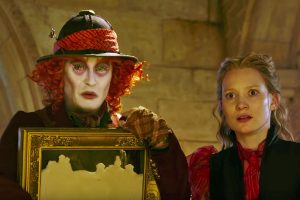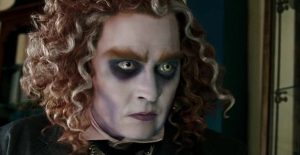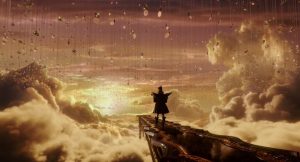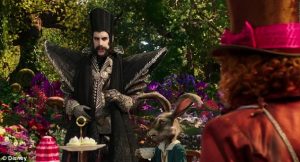![]()
Expectations are a funny thing. As a critic, we always try our best to come in without any preconceived notions of what we’re about to see. Still, we’d be lying if we didn’t admit that occasionally there is some bias squirreled away (even subconsciously) in the back of our heads. I wasn’t a big fan of Disney’s 2010 live-action take on Lewis Carroll’s Alice in Wonderland. For me, the visuals were so garish and overwhelming that they actually distracted from the characters and story.
 Alice Through the Looking Glass returns viewers to the very same world and as such didn’t hold much appeal to me. As expected, this follow-up still possesses many of the same quirks and issues that I had with the original. However, there’s a more somber tone this time out. The story also provides higher stakes and a little more drama than I anticipated. Warts and all, this made for a nice surprise – in several respects, it’s a modest improvement on its predecessor.
Alice Through the Looking Glass returns viewers to the very same world and as such didn’t hold much appeal to me. As expected, this follow-up still possesses many of the same quirks and issues that I had with the original. However, there’s a more somber tone this time out. The story also provides higher stakes and a little more drama than I anticipated. Warts and all, this made for a nice surprise – in several respects, it’s a modest improvement on its predecessor.
Plot-wise, besides the presence of a Jabberwocky dragon, this tale has little to do with its source material. Alice (Mia Wasikowska) is reintroduced as a naval captain who finds her family in dire financial straits. Before these matters can be resolved, she’s summoned back to Wonderland where The Mad Hatter (Johnny Depp) is in a sickly, depressed state. He pleads with Alice to help him find his lost family members, thought to be killed by a dragon, but whom he believes are still alive. Alice soon learns that the only way to find out what happened is to visit Time himself (Sacha Baron Cohen) and steal a time-travel device. This is so she can steer through history in the hopes of altering the past. However, doing so comes with dangerous consequences.
 As mentioned, this is a direct sequel and there’s still a tendency toward some over-the-top histrionics. Depp’s role requires a more subtle performance, but one still can’t help but be distracted at times by the outrageously loud, garish make-up and hair. The same goes for The Red Queen (Helena Bonham Carter), who is back to her usual shenanigans. Again, the screams and digitally morphed appearance of the returning player can’t help but be off-putting and distancing.
As mentioned, this is a direct sequel and there’s still a tendency toward some over-the-top histrionics. Depp’s role requires a more subtle performance, but one still can’t help but be distracted at times by the outrageously loud, garish make-up and hair. The same goes for The Red Queen (Helena Bonham Carter), who is back to her usual shenanigans. Again, the screams and digitally morphed appearance of the returning player can’t help but be off-putting and distancing.
A majority of the humor is geared towards the very young. Much of it includes the animal and mechanized creatures tripping over themselves. It may be hilarious for the kids, but won’t generate laughs for older audience members. And while original, the time-jumping story doesn’t make a whole lot of sense when you stop and think back about it all (although just about every time-travel tale leaves an unanswered question or two).
 At least director James Bobin (The Muppets, the Flight of the Conchords TV series) does have a couple of tricks up his sleeve. Some of the imagery is unique, taking a seafaring theme and presenting time as a wavy, tumultuous ocean. Additionally, Time’s fortress is impressive to behold as are the thousands of time-pieces hanging in the sky. And despite being post-converted from 2-D, the digital environments work very well with an extra dimension. There’s a lot of impressive depth on display. The most striking images come during the climax which involves an unraveling universe crumbing to pieces – it’s dynamic and given the seriousness of the situation, appropriately freaky.
At least director James Bobin (The Muppets, the Flight of the Conchords TV series) does have a couple of tricks up his sleeve. Some of the imagery is unique, taking a seafaring theme and presenting time as a wavy, tumultuous ocean. Additionally, Time’s fortress is impressive to behold as are the thousands of time-pieces hanging in the sky. And despite being post-converted from 2-D, the digital environments work very well with an extra dimension. There’s a lot of impressive depth on display. The most striking images come during the climax which involves an unraveling universe crumbing to pieces – it’s dynamic and given the seriousness of the situation, appropriately freaky.
 The biggest ace is Cohen himself as the eccentric Time, chasing Alice through several eras in Wonderland history. Veering between politeness, arrogance, frustration and blatant threats, he earns several chuckles, particularly during his time-sensitive interactions with the cryptic and playful Hatter. And Wasikowska is agreeable as the plucky heroine. Finally, the morals and themes of loss, forgiveness and striving to achieve the impossible are worthy, even if they are stated outright too many times.
The biggest ace is Cohen himself as the eccentric Time, chasing Alice through several eras in Wonderland history. Veering between politeness, arrogance, frustration and blatant threats, he earns several chuckles, particularly during his time-sensitive interactions with the cryptic and playful Hatter. And Wasikowska is agreeable as the plucky heroine. Finally, the morals and themes of loss, forgiveness and striving to achieve the impossible are worthy, even if they are stated outright too many times.
I’m not sure that this series was made for me at all, but after foreseeing the worst, Alice Through the Looking Glass entertained me slightly more than I expected. It’s uneven and patchy, but does offer a couple of interesting twists and in the end connects a bit more than its predecessor. It may be faint praise, but for a family film one could do much worse.


